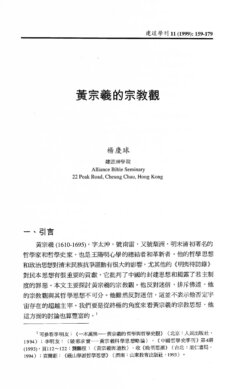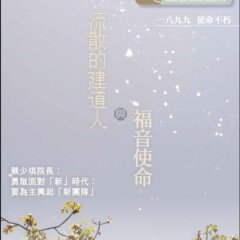黃宗羲的宗教觀 / 楊慶球
撮要
本文主要探討黃宗羲(梨洲)的宗教思想。梨洲繼承儒家心性觀,但卻避免了心統有萬物的唯心思想,他肯定世界的客觀實有,這就是氣。他肯定理在氣內,而心與氣相通,這使他無去接受佛教的「空」,及道教的「無」。世界實有是氣, 氣至尊的稱謂就是上帝,祂是創生宇宙萬物又賦予萬物的規律。這相當於西方的自然神論(Deism)。梨洲雖然不相信一位人格神,但這種宇宙實有的觀念,使他對超越的上帝有一定的肯認,這種肯定與心性論產生張力,但卻是外王事工的預設理論。上帝是萬有至尊的稱謂,祂本身是一秩序,凡合於序的就是善,不合於序的就是惡。惡是反常的現象,是暫時的;善是宇宙流行的最終目的,外王事工就是如何循序去建立文化生活。而序的來源出於心,這是心與上帝相通,上帝既是超越又是內在的,這是梨洲宗教觀的特色。
ABSTRACT
This paper attempts to investigate Huang Tsung-hsi’s (1610-1695) philosophy of religion. Huang was one of the scholars of the mind-and-heart (hsin hsing) school (Yang-ming school) in the late Ming and early Ch’ing dynasty. He reinforces the existence of objective reality, that is, Ch’i (vital force). Li (order) is inside Ch’i; Ch’i and heart are in co-ordination. Huang’s realism makes him reject the “emptiness” of Buddhism and “nothingness” of Taoism. The supreme name of Ch’i is God. God created all the things and laid the order of the universe. His theory of God is similar to the concept of Deism of Western Philosophy. He does not believe in a personal God. However, the belief of objective reality makes him accept the concept of a transcendental God. This realism creates a tension between the “heart-and-mind” theory and the concept of a transcendental God. We find that this realism is the foundation of his external ministry. The supreme name of the Universe is God, He himself is an order. The things that accord with order is “good”, while the things that do not accord with order is “evil”. The evil is temporary or contingent. The universe should ultimately be in according with the order. External ministry has to observe order in order to build up the ideal human life. Huang stresses that order can be found in the mind-and-heart, for order is not absent from our mind. Therefore, the mind of human is connected to the way of God. God is transcendent and also immanent. This is the characteristic of Huang Tsung-hsi’s philosophy of religion.
原載於《建道學刊》11期(1999年1月),頁159-179。







